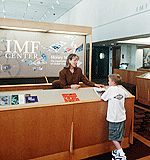
|

|
 |

|
 |
 |
| a public center for economics education |
| 720 19th Street, N.W. - Washington, DC 20431 |
Exhibits |
Permanent Exhibits - Changing Exhibits
| Permanent
Exhibits |
Money
Matters: The Importance of Global Cooperation
Although money affects all our lives and we deal with it every
day we understand very little about the role and importance
of money and the international monetary system. Do you know
how the economy of one country is affected by what goes on in
other countries? Do you know what causes the value of a currency
to go up or down? This permanent
exhibit tells the story of the international monetary system,
how it affects our daily lives, and the role of the International
Monetary Fund in the global economy.
|

IMF Center Exhibit
|
Ancient
Trade Route Collection
"...and Allah created the two precious metals, gold and silver,
to serve as a measure of the value of all commodities..."
Ibn Khaldun
This collection of ancient coins is a historical representation
of trade between ancient civilizations. Coins serve historians
as markers of time. They confirm the powers in place in any
given region and define the "money trails" that connected the
ancient world. Trade played a key role in transforming attitudes
toward precious metal - from it being valued chiefly as weighed
bullion to it becoming equally acceptable in the form of coins.
In the Near East, the monetary use of precious metals dates
back to the ancient civilizations of Mesopotamia and Egypt.
Small pieces of electrum, a naturally occurring amalgam of silver
and gold, were stamped with the king's seal to officially designate
them as "money." As the first "world currency," staters circulated
widely in a flourishing, sea-going trade linking Greek ports
with those in Carthage, Egypt, Syria, Italy, and other remarkably
distant realms. The sheer extent of this ancient intercontinental
trade-based on a civilization shaped by mercantile, not military
imperatives-seems all the more amazing given the absence of
roads connecting the port cities with the inland kingdoms. By
100 AD, camel caravans were routinely plying the Persian and
Kushan Empires exchanging war horses for silk, bronze tools,
carved jade, and medicinal herbs. The "Silk Road" was one of
the most important economic and cultural connections ever established.
|
Seven
Economists Poster Exhibit
What are physiocrats? How did mercantilism help move the Middle
Ages out of feudalism? What is the "principle of population"
and who developed it?
The Seven Economists exhibit represents the theories of reknowned
economists and thinkers, from Ancient Greece through the Middle
Ages. From Plato to Adam Smith to John Maynard Keynes, these
are the minds that helped shape global economic systems.
The economic and social paradigms of some of the greatest minds
in history are presented in this historical study of the political
economy. While St. Thomas Aquinas advocated the permissibility
of private property in a feudal system, Karl Marx argued that
economics was dominating factor in history as expressed through
class struggle, and Adam Smith put forth his ideas on the "division
of labor."
This poster exhibit is located in the foyer of the IMF Center
auditorium. |
|
|
|
Changing
Exhibits |
The Wild Wired World of ECommerce - [Until end of 2003]
The International Monetary Fund is proud to present this ecommerce exhibit as part of a series of exhibits portraying our evolving global economy. It highlights the fascinating facts...faces...and future of the dynamic new electronic economy now taking the world by storm. Rapid evolution and tumultuous change are landmarks of the internet economy. It's a history in the making that will profoundly affect our lives in ways we can't yet predict. So hang on, and enjoy a wild ride!
|
|
|
|